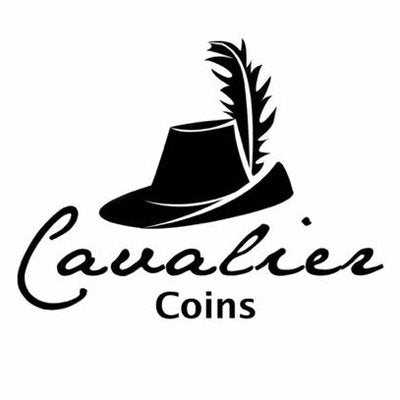Before you even think about where to sell your coins, it’s worth remembering a golden rule: preparation is everything. Taking a few simple steps before you list them can make a huge difference to the final price you get. And no, this doesn't mean getting out the polish – that's one of the most common and costly mistakes you can make. It’s all about understanding exactly what you've got.
Preparing Your Coins for a Successful Sale
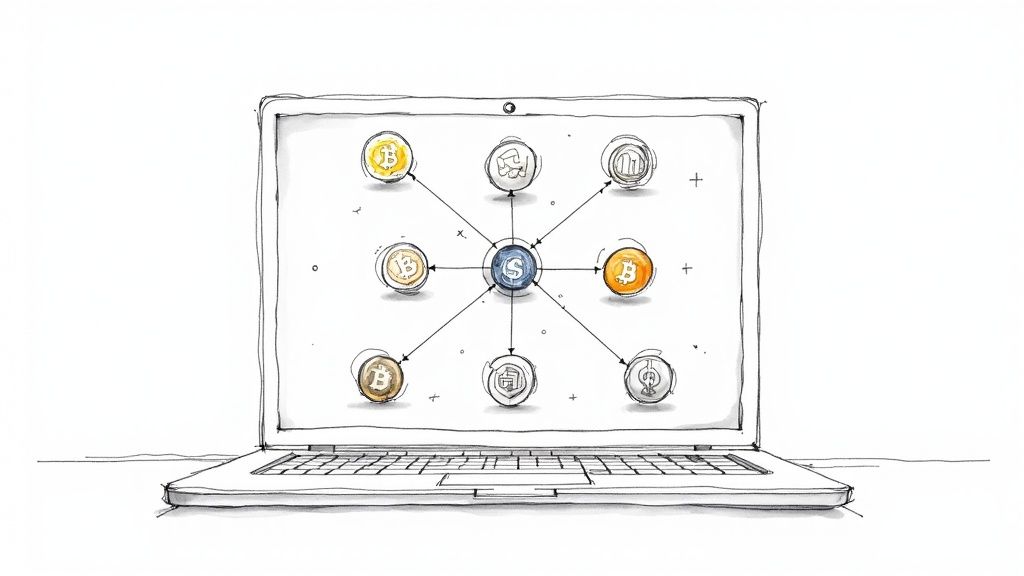
To get the best price, you need to know the story your coins tell. This initial bit of homework is absolutely non-negotiable if you want a profitable sale. It’s about figuring out the coin's origin, its date, any mint marks, and getting a realistic idea of its condition.
One of the most crucial parts of valuing a coin is its grade. This isn't just someone's opinion; it's a standardised scale that all serious collectors and dealers rely on to describe a coin's condition. For instance, a coin that has never seen a day of commerce is graded as 'Uncirculated' (UNC). At the other end of the scale, a coin that's been heavily worn might be graded as 'Poor' (P-1). The gap in value between these grades can be absolutely astronomical.
Understanding Coin Grading
Whatever you do, never clean your coins. It’s tempting, I know, but cleaning strips away the natural patina that develops over time and leaves behind tiny scratches. Both of these things will instantly lower a coin's grade and torpedo its value. Instead, just focus on an honest assessment.
So, what are dealers and graders actually looking for? It comes down to a few key things:
- Lustre: This is that original, unique sheen a coin has when it first leaves the mint.
- Strike: How clearly and sharply was the design pressed into the coin? A crisp strike is always better.
- Surface Preservation: Are there any scratches, dings, marks, or signs of corrosion?
- Eye Appeal: This is a bit more subjective, but it’s the overall look and feel of the coin. Does it just look good?
This guide here gives a great visual of the different stages of wear.

As you can see, the difference between a 'Good' and 'Fine' grade comes down to subtle details in how the design has worn down, and those details have a direct impact on what someone will pay.
Documenting Your Collection
Another thing you can do to strengthen your position is to gather up any related paperwork. If you happen to have a certificate of authenticity, the original packaging, or even an old receipt, it adds a layer of provenance that serious buyers absolutely love. This kind of documentation proves the coin is legitimate and can really boost its perceived value.
It's also interesting to see how the wider financial world is changing. In the UK, for example, we've seen a huge rise in people getting involved with digital assets, with nearly 24% of the population now dabbling in crypto. You can read more about this on Cointelegraph. While old coins are a world away from crypto, it shows a growing comfort with alternative assets and online trading, which could mean more buyers in the digital marketplaces where you might sell.
Key Takeaway: The biggest mistake you can make is rushing to sell without doing your homework. Identifying your coin, honestly assessing its grade (without cleaning it!), and gathering any documentation are the foundational steps to getting the best possible return.
Choosing the Right Venue to Sell Your Coins
Deciding where to sell a coin can feel like a bigger decision than the sale itself. The best place really depends on what you're trying to achieve. Are you hoping to get the absolute highest price for a certified rarity? Or do you just need to turn an inherited collection into cash, and quickly?
Each option strikes a different balance between speed, convenience, and the final payout.
There's no single "best" place to sell. It's all about matching your specific coin and your personal needs to the right marketplace. For instance, a prestigious London auction house is the perfect stage for a rare Sovereign. You'll get international collectors competing, which can seriously drive up the price.
But that same auction house would likely turn away a jar of common pre-decimal pennies. Those would be much better suited for a local dealer or an online sale as a bulk lot.
Local Coin Dealers and Shops
For many people, the most straightforward route is simply visiting a local coin dealer. A reputable dealer, especially one registered with the British Numismatic Trade Association (BNTA), can give you an immediate, on-the-spot valuation and a cash offer. It's fast, it's simple, and it cuts out all the hassle of photography, listing, and shipping.
Of course, that convenience comes at a price. Dealers are running a business and need to make a profit, so their offer will naturally be below the coin's full retail value. This "dealer spread" is how they cover their overheads. This is the ideal option if you value speed and certainty over squeezing every last pound out of the sale.
Expert Tip: Never accept the first offer you receive. If you can, visit at least two or three different dealers. You might be surprised by how much valuations can vary based on a dealer's specific interests and what they currently have in stock.
Navigating Auction Houses
Auction houses are the top tier of the market, really reserved for coins of significant value and rarity. When you submit your coin to a house like Spink or Dix Noonan Webb, you're exposing it to a global audience of serious, vetted collectors—people willing to pay top prices for premium items.
The whole process is a bit slower and more formal. It involves a consignment agreement, professional cataloguing, and then waiting for the scheduled auction date. The auction house also takes a hefty commission, often 15-25% of the final hammer price. However, their expertise in marketing and reaching the right buyers can result in a much higher sale price that more than covers their fee.
This decision tree shows the trade-offs between speed and price for local selling options.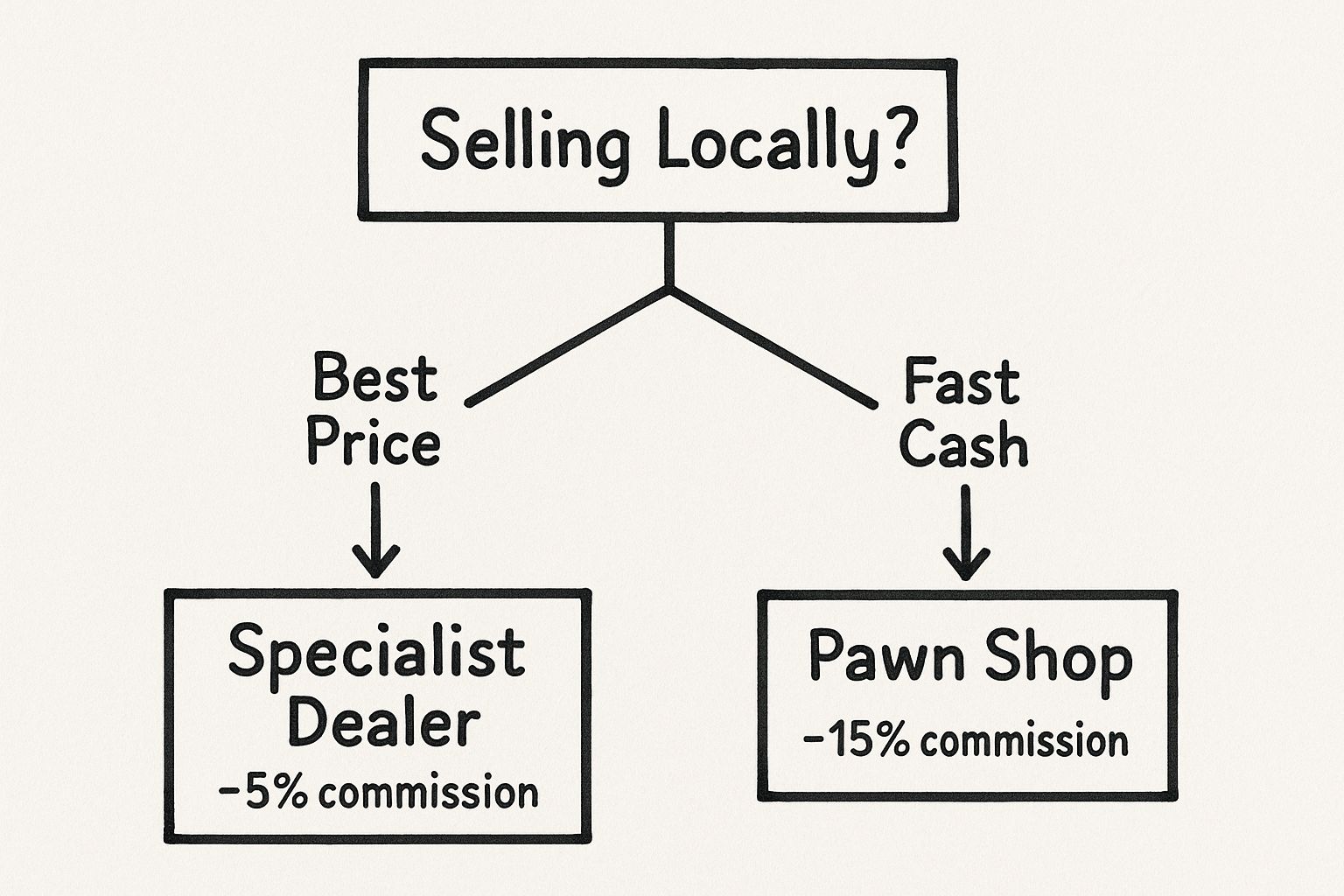
As the infographic shows, for local sales, a specialist dealer is your best bet for a good price, whereas a pawn shop offers the fastest cash but at a much higher commission.
Online Marketplaces and Forums
Platforms like eBay put you in the driver's seat, opening your listing to a massive audience. This can be a brilliant option for mid-range coins or for sellers who actually enjoy the process. You set the price, you write the description, and you handle the shipping. This means you also keep a larger slice of the final sale price, minus the platform's fees.
To see which online venue might suit you, you can explore these top options for selling old coins in 2025.
Success online really hinges on creating a trustworthy and appealing listing, and high-quality photographs are non-negotiable. Don't overlook specialised numismatic forums, either. They can connect you directly with passionate collectors looking for very specific items, often leading to a quick and fair sale without the fees you'd find on a larger marketplace.
Comparing Coin Selling Venues in the UK
To make things a bit clearer, here's a side-by-side look at the different platforms. This should help you decide where to sell your coins based on what matters most to you.
| Selling Venue | Potential Price | Sale Speed | Convenience | Best For |
|---|---|---|---|---|
| Local Coin Dealer | Lower (Wholesale) | Very Fast (Instant) | Very High | Quick cash, inherited collections, common coins. |
| Auction House | Highest (Retail+) | Slow (Months) | Low | High-value rarities, certified coins, unique items. |
| Online Marketplace (e.g., eBay) | High (Retail) | Medium (Weeks) | Medium | Mid-range coins, taking control of the sale yourself. |
| Numismatic Forum | Good (Fair Market) | Varies | Medium | Specific collector coins, engaging with the community. |
Ultimately, the right choice is a personal one. A local dealer offers immediate cash, an auction house targets the high-end market, and online platforms give you control. Weigh your priorities, consider your coin's value, and pick the path that feels right for you.
Mastering Online Marketplaces like eBay
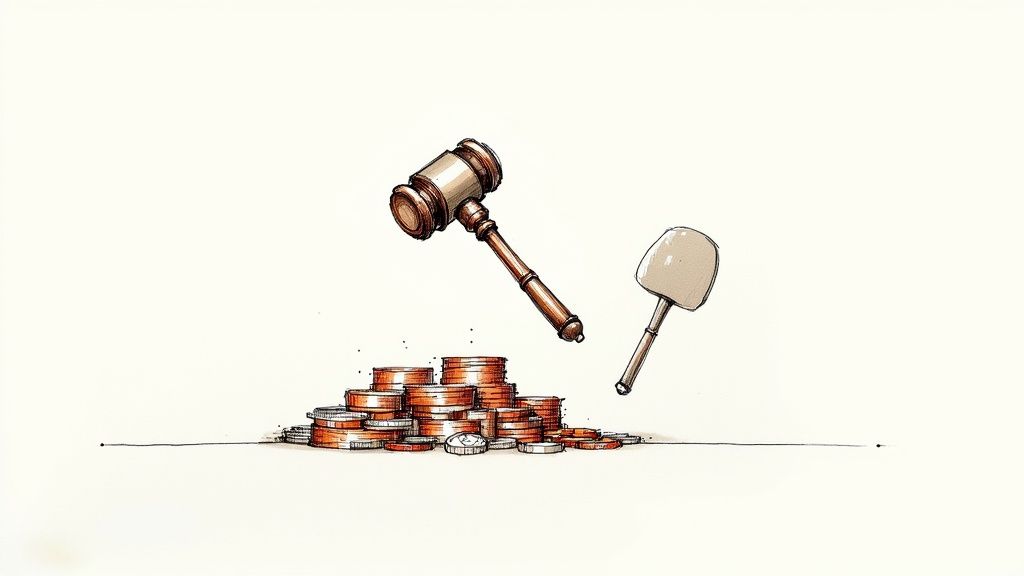
Putting your coins on platforms like eBay opens them up to a global audience, which is fantastic. The flip side? You’re stepping into a massive, bustling arena with tons of competition. To get noticed and get the price you deserve, your listings can't just be good—they have to be exceptional.
The secret is to put yourself in the buyer's shoes. Imagine you’re looking to buy a coin without being able to hold it. What would you need to see and read to feel confident hitting that 'buy' button? Every single element, from the title to the last photo, plays a part in building trust and maximising your sale price.
Crafting a Compelling Listing
Think of your listing's title as its headline. It’s your first, and arguably most important, chance to grab a collector's attention. It needs to be loaded with the specific keywords people are actually typing into the search bar.
A title like "Old Silver Coin" is a recipe for getting lost in the noise. Something like "1887 Queen Victoria Silver Shilling - Good Condition - British Coin" is a world apart. It immediately tells a potential buyer the year, monarch, denomination, metal, condition, and origin. All the crucial info, right up front.
Your description is where you back this up with total honesty. Be upfront about any scratches, dings, or wear. Transparency is everything in this game. Collectors respect honesty, and it’s the best way to avoid any headaches or disputes down the line. For a deeper dive into these strategies, you might want to check out our complete guide to maximising profit when selling coins online.
The Power of High-Quality Photos
Let's be blunt: your photos are your ultimate sales tool. Blurry, dark pictures scream 'amateur' and can make a fantastic coin look worthless. You don't need a high-end studio, but you absolutely have to nail the fundamentals.
Here are a few simple tips that make a huge difference:
- Embrace Natural Light: Forget the harsh camera flash. Find a spot by a window where you can get soft, natural daylight.
- Show Both Sides: It sounds obvious, but you must have crystal-clear shots of the obverse (heads) and the reverse (tails).
- Don't Forget the Edge: A quick snap of the coin's edge can reveal crucial details about its strike and wear patterns.
- Show, Don't Just Tell: Use your photos to back up what you've written. If you mentioned a tiny scratch in your description, make sure it’s visible in a photo.
Expert Takeaway: Treat your listing like a professional online appraisal. The goal is to provide such clear, detailed information and high-quality images that a buyer feels like they've examined the coin themselves. That's how you build the trust needed to get the best price.
Pricing, Fees, and Building Trust
So, should you go for an auction or a fixed-price 'Buy It Now' listing? It really depends on the coin. An auction can spark a bidding war for rare and sought-after pieces, sometimes pushing the final price far beyond your expectations. On the other hand, a fixed-price sale gives you certainty and is ideal if you already know what your coin is worth.
Don't forget to account for platform fees. These are usually a percentage of the final sale price, sometimes with listing fees on top. You need to build these into your calculations to figure out your actual profit.
Finally, building trust is the glue that holds it all together. Be ready to answer questions quickly and politely, and always be clear about your postage plans. A good reputation is worth its weight in gold.
Working with Professional Dealers and Auction Houses
When your coin collection starts to feature some seriously valuable pieces or genuine rarities, the DIY approach of an online marketplace just might not cut it. This is where you step up to the premier league of coin selling: working with professional dealers and established auction houses.
Going this route gives you direct access to deep expertise and a ready-made network of serious collectors, which often translates into a much higher final price. Understanding how this world works is the key to getting the absolute most for your treasures.
Finding the Right Expert
First things first, you need to find the right person for the job. Not all dealers are created equal, so you've got to do a bit of homework. Look for credentials that scream trustworthiness and genuine expertise.
A brilliant place to start is the British Numismatic Trade Association (BNTA). Its members are properly vetted and have to stick to a strict code of ethics. This gives you a fantastic layer of protection and the peace of mind that you're dealing with a true professional.
The Professional Appraisal Process
Once you've connected with a dealer or auction specialist, the next step is the professional appraisal. This isn't just a quick glance and a guess; it's a deep dive. An expert will meticulously examine your coins under magnification, assessing their grade, checking for authenticity, and spotting any unique characteristics that could bump up the value.
Don't be shy during this part of the process. Ask questions! A good numismatist will be more than happy to walk you through what they're seeing and explain their valuation. Think of it as a free lesson in what makes your collection special.
Insider Tip: Before you head to your meeting, get your collection organised. Presenting your coins neatly, maybe in protective flips with any paperwork you have, shows you're serious. It’s a small thing, but this simple bit of prep can subtly work in your favour when it comes to negotiation.
Understanding Consignment and Auctions
If you decide an auction house is the best fit, you won’t be walking away with cash in hand. Instead, you'll enter into what’s called a consignment agreement. This is basically a formal contract giving the auction house permission to sell the coin for you. They then take care of everything—from professional photography and cataloguing to marketing your coin to their global list of buyers.
As part of the agreement, you’ll set a reserve price. This is the confidential, absolute minimum price the coin can be sold for. It’s your safety net, ensuring your prized piece doesn't go for a song.
After the gavel falls, you'll receive the final "hammer price" minus the auction house's commission and any other fees you agreed upon. While these fees can feel steep, often around 15-25%, the access to high-end collectors frequently results in a sale price that makes it a very smart move. Handing it over to a pro ensures your coin gets the spotlight it truly deserves.
How to Finalise Your Sale and Ship Coins Safely
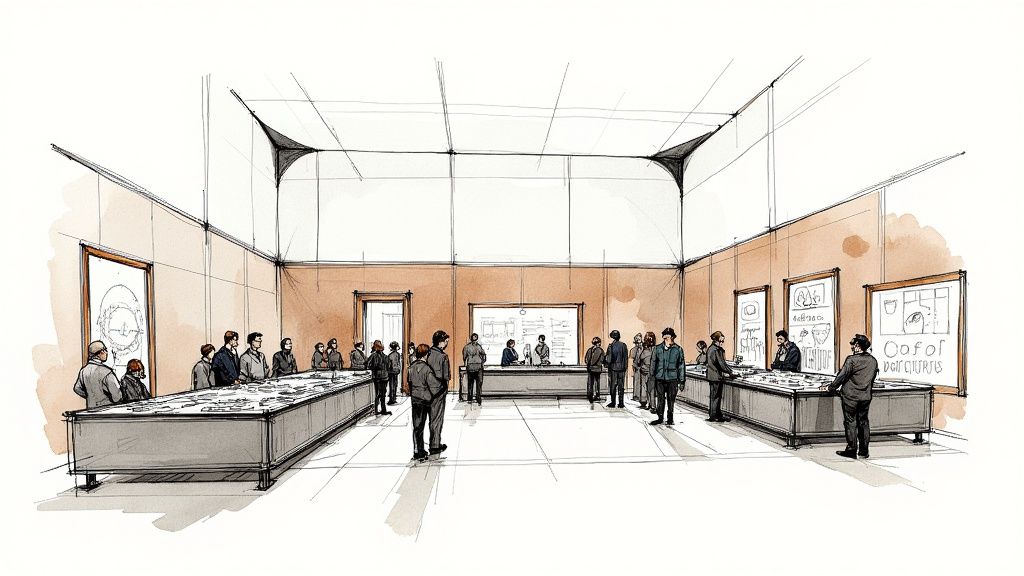
Once you've found a buyer and shaken hands on a price, the final steps are all about executing a secure and seamless handover. This last stage is where attention to detail really counts, protecting both you and your buyer and ensuring your hard work pays off.
Successfully closing the deal comes down to two key areas: secure payment and safe shipping. Mishandling either can quickly turn a profitable sale into a stressful ordeal.
Protecting Your Coins in Transit
Packaging a coin isn't as simple as just popping it in an envelope. Coins, especially those with high numismatic value, are delicate. Their surfaces can be easily scratched, and a heavy knock can cause damage to the rim, both of which can seriously reduce their value.
Your packaging strategy should be layered for maximum protection:
- Primary Holder: First, place the coin in a soft, non-PVC plastic flip or a cardboard 2x2 holder. This prevents any direct contact with other materials.
- Cushioning: Next, wrap the holder securely in bubble wrap or place it between two firm pieces of cardboard, taping the sides to stop it from sliding out.
- Outer Packaging: Finally, use a sturdy, padded envelope or a small, well-taped box for the final layer. The goal is to make sure the coin cannot move around inside the package during transit.
Your packaging is the final act of care for your coin before it reaches its new owner. A well-packaged coin not only prevents damage but also signals to the buyer that they have dealt with a professional and conscientious seller.
Choosing the Right Shipping Method
Never cut corners on shipping when you sell a coin. Standard post is simply not an option for items of value. You need a service that provides both tracking and adequate insurance to cover the full value of the coin should anything go wrong.
For UK sellers, Royal Mail Special Delivery Guaranteed is the industry standard. It offers end-to-end tracking, a signature on delivery, and insurance coverage for valuables. This protects you from claims of non-delivery and gives your buyer complete peace of mind.
For a comprehensive overview of the entire process, you can explore our detailed guide on how to sell coins in the UK.
Lastly, always confirm payment before you dispatch the item. Use secure payment methods like PayPal Goods & Services or a direct bank transfer. Be wary of unusual payment requests, as they can sometimes be a red flag for scams. By managing these final steps with care, you guarantee a smooth, secure, and successful sale from start to finish.
Common Questions About Selling Coins in the UK
Stepping into the world of coin selling for the first time can feel a bit daunting. You’ve probably got a lot of questions running through your head, from working out a coin's real value to deciding if you should sell your pieces one by one. Getting some clear, straightforward answers is the key to making a successful sale.
Let's walk through some of the most frequent queries we hear from people just like you.
How Can I Get My Coins Valued for Free in the UK?
It’s easier than you might think. Plenty of reputable coin dealers and specialist auction houses are happy to offer free, no-obligation appraisals. You can pop into a local dealer for a chat, or for an even more convenient first look, just send some clear photos to an auction house.
Online numismatic forums are also a decent shout for informal valuations from seasoned collectors. But, a word of caution: for a formal valuation, say for insurance or a particularly high-value sale, paying a certified professional is the only way to go. Be very wary of any service that asks for an upfront fee just for a quick opinion.
Is It Better to Sell Coins Individually or as a Collection?
This is a classic question, and the answer really hinges on what you’ve got. If your collection includes several rare or high-grade coins, selling them individually will almost always fetch you more money. Think about it – serious collectors are hunting for specific pieces to finish their sets and will pay a premium to get them.
On the other hand, if you're sitting on a large number of common coins, or perhaps a complete set (like all the shillings from a certain monarch's reign), selling them as a single lot is often far more appealing to buyers. It's also a lot less hassle for you. A good dealer can give you some tailored advice on the best strategy for your specific coins.
Key Insight: If you take only one piece of advice, make it this: never, ever clean your coins. Cleaning strips away the natural patina and creates tiny micro-abrasions, which can completely destroy their numismatic value and send their worth plummeting.
What Are the Biggest Mistakes to Avoid When Selling Coins?
Aside from the cardinal sin of cleaning them, one of the most common pitfalls is having unrealistic price expectations. It’s vital to do your research first. Another frequent misstep is taking poor-quality, blurry photographs for online listings – it’s a sure-fire way to put off potential buyers before they’ve even had a proper look.
Finally, always, always use insured and tracked shipping for anything valuable. Sending a rare coin via standard post just isn't worth the small amount you might save. It's a risk you really don't want to take.
Are Old British Pennies Worth Anything?
For the most part, 20th-century British pennies are incredibly common and aren't worth much unless they are in absolutely perfect, uncirculated condition. Decades of being passed from hand to hand mean there are millions of them still out there, so they don’t have rarity on their side.
However, certain dates and varieties can be extremely valuable. The 1933 penny is the most famous example of a rare British coin, but other key dates or error coins can also command surprisingly high prices from collectors. It always pays to double-check the date and condition of any older coin before you write it off.
At Cavalier Coins Ltd, we are passionate about helping collectors build and manage their collections. Whether you're a seasoned numismatist or just starting, explore our extensive selection of rare coins and banknotes at https://www.cavaliercoins.com.
